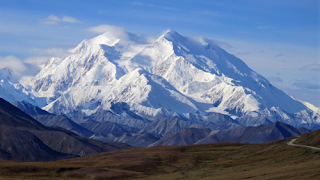 |
| Denali, photo by AP, Boston Herald |
***
This headline jumped out at me today: Alaska-bound, Obama renames America's tallest peak.One thing about Alaskans is they don't like being told what to do. We're so used to being free to chart our own ways, that someone from the "outside" ('outside' in Alaska usually means the lower forty-eight states; it can also mean not a member of the group) is automatically resisted. So, having President Obama tell me that Mount McKinley is now to be known as Denali rubs.
***
 |
| Sydney Laurence, Mt. McKinley, Wikipedia |
***
However, I've always known it by both names and so have most of the people who have lived here for a while, so it's really nothing new. Denali (or McKinley) is like a jewel set near the center of the state. It's also a magnet for adventurers who want to prove themselves by climbing it. For information on climbing Denali, check out the National Park Service (NPS) FAQ page. In 2011 Fairbanks' daily newspaper, the Newsminer, published the piece, Charge climbers the cost: Mountain safety programs drain Denali's budget. In the article, it's said
Search and rescue costs, which rescue beneficiaries or insurance companies might pay, are over and above the $1.3 million dollar program cost and average about $200,000 per year. The cost of major rescue incidents is paid for out of funds appropriated by Congress for other NPS purposes. Annual rescue costs don’t impact the local Denali budget and programs, but do negatively impact other NPS programs nationally.Denali may be beautiful, but it can also be deadly. In fact, living in Alaska can be deadly.
***
 |
| Iceberg in Portage Lake, Alaska.net |
***
Speaking of rescues, this piece also caught my eye: Good Samaritans rescue hypothermic kayakers from Portage Lake. Portage Lake is about half-an-hour's drive from Anchorage. According to the U. S. Search and Rescue Task Force (USSARTF):
Expected Survival Time in Cold Water
Water Temperature
|
Exhaustion or Unconsciousness in
|
Expected Survival Time
|
70–80° F (21–27° C)
|
3–12 hours
|
3 hours – indefinitely
|
60–70° F (16–21° C)
|
2–7 hours
|
2–40 hours
|
50–60° F (10–16° C)
|
1–2 hours
|
1–6 hours
|
40–50° F (4–10° C)
|
30–60 minutes
|
1–3 hours
|
32.5–40° F (0–4° C)
|
15–30 minutes
|
30–90 minutes
|
<32° F (<0° C)
|
Under 15 minutes
|
Under 15–45 minutes
|

No comments:
Post a Comment